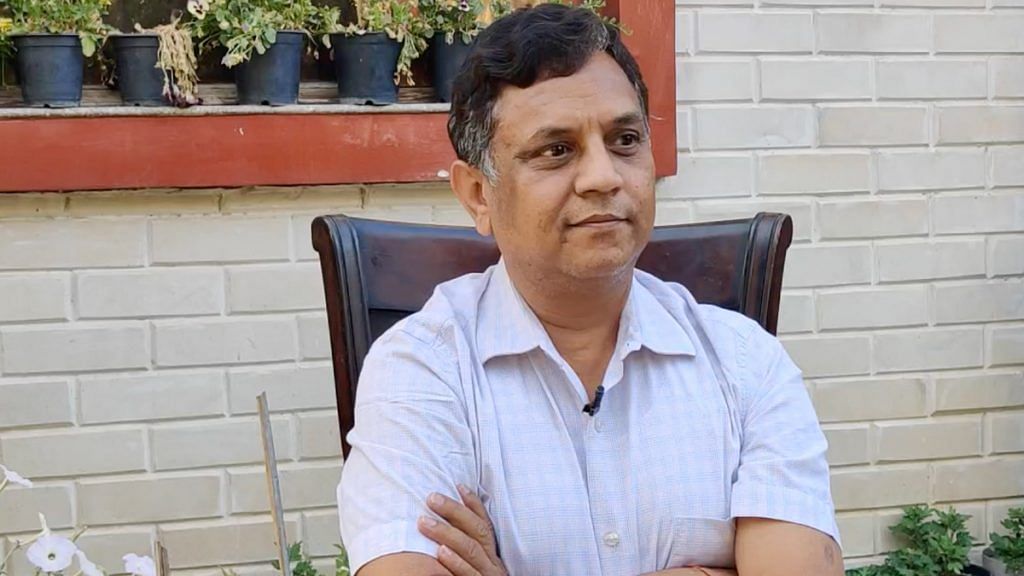New Delhi: A group of scientists at Jawaharlal Nehru University (JNU)’s Centre for Molecular Medicine are researching the efficacy of a revamped tuberculosis vaccine, the BCG, which has been infiltrated with the Covid-19 protein to potentially protect people from the novel coronavirus that has wreaked havoc across the world.
Led by well-known immunologist Dr Gobardhan Das, the team is working on the hypothesis that nations with mass BCG immunisation — including India, Portugal and Japan — have, at least so far, been better able to deal with Covid-19 because people of these countries, as children, have been given the BCG vaccine, thereby creating herd immunity.
But Das is now going one step further. In an exclusive interview to ThePrint, Das said he and a team of scientists in JNU have “teamed up for a BCG+ vaccine by expressing Covid-19 proteins into it”, which could potentially protect people from the novel coronavirus.
He said the experiment could “take another 3-4 months”, followed by randomised control trials to test the efficacy of such a vaccine.
Asked why he was so focussed on the BCG vaccine, Das pointed out that “there is a worldwide spread which shows a fantastic correlation between BCG immunisation & vulnerability towards Covid-19”.
This means countries which have subject their nationals to mass BCG immunisation campaigns as children have a much greater pre-immunity to not just disseminated tuberculosis, but also meningitis and leprosy.
‘Indian population may have a good chance’
Das’ work links to the discovery by noted Romanian scientist Mihai Netea of “trained immunity”, which says a person’s innate immune system has a memory that “remains in a state of high alert for several months after an infection”, thereby allowing the immune system to respond more quickly to new infections.
Netea’s research also found that it is possible to “train this memory”. In the case of the BCG vaccine, Netea found that switching on the immune system’s memory would mean stimulating immune cells not just against tuberculosis but other infections as well.
Das believes these other infections could potentially include Covid-19. He also pointed out that alongside the BCG vaccine, it was imperative to remember that in India’s case, the population was also constantly subject to several mycobacterial infections which create their own set of antibodies.
“Along with the early lockdown announced by Prime Minister (Narendra) Modi, which was a very good measure, the pre-immunity generated by the BCG vaccine plus exposure to other mycobacterial infections means that the Indian population may have a good chance to fight the coronavirus,” Dr Das said.
But Dr Gagandeep Kang, noted bio-scientist and director of the Translational Health Science and Technology Institute told ThePrint that “while (Dr Das’ hypothesis) was plausible, I am unconvinced. I would like to see individual level data or a randomised controlled trial”.
“I think we are still early,” Kang said, adding, “and the lockdown has helped.”
In the JNU lab, Das said, the ongoing experiment to infiltrate the BCG vaccine with Covid-19 proteins was intended to develop a vaccine to inoculate against the novel coronavirus.
In the meantime, he said, the government should start revaccination of the population with BCG, starting with the elderly, who would have lost their immunity to a much greater degree than younger people.
Also read: Inside a Covid-19 test facility — no watches, no room for error and no time for a wedding
What the toll suggests
Das admitted that his hypothesis was just that right now — a hypothesis — and that he had no scientific proof to back it, except correlating the spread and pattern of the coronavirus pandemic as it gradually spread across the world from Wuhan in China since December 2019.
“Countries like the US, Italy and Spain, which have no mass BCG immunisations have had a much higher toll,” Das said. “Countries like India, Japan and Portugal have, at least so far, been able to deal with this disease much better.”
Spain, which does not have BCG mass immunisation, has 130,759 Covid-19 cases and 12,418 deaths so far, while Portugal next door, which has a mass BCG immunisation, only has 11,278-odd cases and 295 deaths, he said.
Similarly, as of 6 April, Japan which began its BCG immunisation as far back as 1947 has 3,654 cases. India, which began its immunisation in 1948, has 4,200-plus cases and Brazil, which began its immunisation in 1926, has 11,281 cases so far.
In contrast, the US and Italy, with no mass BCG immunisation, have 336,830 cases (and 9,618 deaths) and 128,948 cases (and 15,887 deaths), respectively.
Das admitted that two outlier countries, China (81,708 cases and 3,331 deaths) and Iran (58,226 cases and 3,603 deaths), both with mass BCG immunisations, had suffered badly from the coronavirus outbreak. Perhaps, the efficacy of these campaigns had faded over time, he added.
Also read: How doctors, health workers are losing the fight against Covid-19 pandemic
